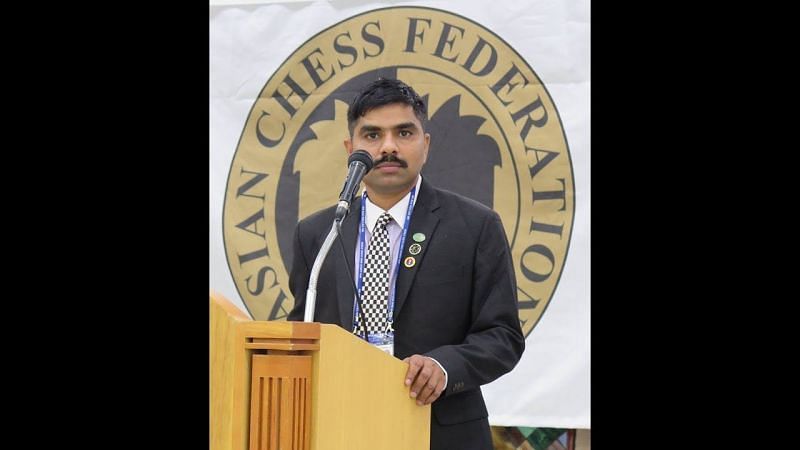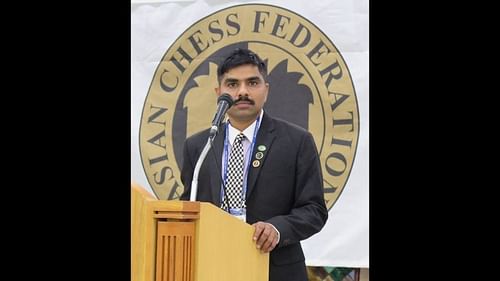
From the Lens of An Arbiter: In Conversation with IA Gopakumar Sudhakaran

Chess is a game for the kings. However, there can be no victory if the king is not supported by other pieces and pawns. It's a team that runs towards the full point. Similarly, during a tournament, it's not just the player who is the king. It's the arbiter, also, who is a part of the core of the team.
If there isn't an arbiter on call, then even the so-called 'king' or player can't always get his or her way. Thus, one cannot miss the back-end story of what goes into making an international arbiter, and what keeps one motivated along this journey of being one. So, we caught up with arguably one of India's finest arbiter's Gopakumar Sudhakaran. Moving on to the questions now.
Let’s go back in time to when it all began. Can you tell us about how you got into chess?
It all started in the year 1991 when my beloved father, Late Shri Sudhakaran Nair, brought me into the world of chess, not only me but, in-fact, my two brothers as well. Within a year, I became the State Champion of Kerala in the Under-12 category, defeating current International Master Ratnakaran in the final round.
Many aspire to become GMs and other titled players, but you took a different route altogether. You became an international arbiter. How did this happen?
The passion for the game brought me to the Arbiter field. I still play in tournaments whenever I get the time, and I play online almost every day. So, even though, I still have the aspiration to become a GM deep inside, but I am happy that my chosen field in chess is giving me a lot of happiness as well.
Also read: Exclusive: Conquering the World at 12- In Conversation with Gukesh D
Can you describe your first moments in your journey to become an arbiter?
Even though I was an arbiter in local tournaments in the beginning, the main change happened when I was an official in my first national event, the National Junior Girls Chess Championship-2003 at New Delhi.
The Asian Youth Chess Championship in the year 2005 changed my career as the current AICF Secretary Bharat Singh Chauhan supported me, which paved my way further. Apart from that, the main catalyst for my journey has been my organisation the Indian Air Force, which provided me with much-needed support.
What does the role of an arbiter entail?
No Arbiter can explain this question fully. As like in every refereeing field, we need to look after the games, while they are in progress, as well as give decisions when a dispute arises, all according to the laws in the official rule book.
The main difference is that referees/umpires are engaged while the matches are on, but arbiters need to work even when the matches have finished like filling the results into the computer software so that the pairings can be made for the remaining matches.
How do you keep your passion for arbitering going?
I believe that learning is a never-ending process, and I get the opportunity to grow in every single tournament. I never get bored while I'm in a championship hall, and these events give me happiness. Thus, I'm able to keep my passion going.
Can you take us through your typical routine? Both during a tournament and on off days.
On tournament days, I like to wake up early to set things moving. I never comprise on punctuality, not only on tournament days but otherwise in my life in general, too. Moreover, I like to be at tournament hall 2 hours prior to the round and check the necessities starting from basic requirements like toilet facilities for players to use during the matches to the requirements on the top board, which generally includes the digital clocks and live game display.
If everything is satisfying, then my confidence level as well as that of my team increases. Therefore, in the tournament hall, it is not the individual, but the team of arbiters that needs to deliver.
The bonding of the team is also very crucial. At the end of the day, I reassess the entire day that's gone by, and in case there's any correction that's required, then I talk to the team and settle the things that need to be corrected to the best of my abilities. I can say that during tournament days, my day starts at 0530 am and ends at midnight.
On off days, my routine sticks to pretty much the same as during an event, the only difference being that I am in an office instead of in a tournament hall. In addition, another thing is that I get an opportunity to play online or read my favourite books.
You have got a chance to be a part of prestigious tournaments with the world’s finest players. How has this experience been like? Can you share some memories from these events?
I got the opportunity to meet the world’s finest players and officiate their matches. Some of them are my childhood heroes and the chess greats of today. Meeting them provided me with a lot of excitement, but at the end of the day, while I'm in a championship hall, I'm supposed to be an Arbiter, who needs to deliver the things as per the laws and not as per the player's stature. Respect and admiration are deep inside me, but I need to treat the greats at par with all the players in the tournament hall.
For me, all the tournaments are cherished memories, but the Olympiad at Tromso (2014) has a special connection because it was my first Olympiad, one of the biggest events in chess. Working as an anti-cheating arbiter in the Baku and Batumi Olympiads provided me with the opportunity to look beyond on the board officiating.
What do you think about the huge rise in Indian chess?
Indian chess is booming and the game has spread widely amongst the grass root levels as well. Mass participation has become the norm, which is a good sign as the popularity of the game is on the rise. Chess improves the thinking, understanding, planning and execution coefficient of an individual, which will benefit the nation in totality, which is definitely a huge plus point.
How can others aspiring to become arbiters become one? You have also given many training talks on arbitering. Can you please tell us something about these events as well?
The process is similar to any field. One needs to start from National to FIDE and then finally to an International Arbiter. However, my sincere advice to the aspiring ones would be that if you feel the passion deep inside you to become an arbiter only then should you choose this profession as without that burning fire inside you, this field will not give you true happiness. As a FIDE Lecturer, I conduct FIDE Arbiter Seminar and examinations. In each seminar, I find a lot of talented people, but it all rounds up to their dedication, which decides their future in this venture.
Finally, what are your future goals and what are some concluding thoughts that you would like to share with us?
“If there’s even a slight chance of getting something that will make you happy, risk it. Life’s too short and happiness is too rare.” A.R. Lucas
Also read: A Grandmaster in Chess and Academics: In Conversation with Priyadharshan Kannappan